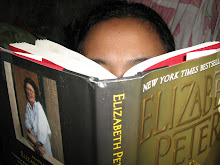Do you know who your father is?
That was one of the questions our "big boss" asked us, "big boss" being Gus A. Vibal or simply GAV, at Wikipilipinas.org. He said that most Filipinos don't know who their ancestors are. Who is your father? Where and when was he born? At what age did he get married? Where did he live? What did he do?
According to GAV, we Filipinos don't like to look back on the past. It's a sort of passive resistance to all those foreign colonizers... we choose to forget them. Myself, personally, I think it's because for us Filipinos, some memories may be too painful to remember. The problem with that is, we also forget the lessons we should have learned from the bad memories, and we also forget the good things that happened. Look at martial law and EDSA, for one. Twenty, thirty years later, the same thing may happen all over again because of our selective memories.
It reminded me of the time I got furious with my tita because she had my great-grandmother's silver keyring melted down and made into necklaces for my sister and me. She was so surprised at my reaction, reasoning that we could use necklaces but not a heavy, church-key shaped silver thing (who uses keyrings anymore anyway, she asked). What I couldn't make her understand was that the original ring, with its hand-etched design of a wreath of flowers and leaves, and my great-grandmother's (her grandmother's) initials (C. L. C., for Cristina Legada Cumoda) , originally intended to hold the keys to the family homestead, was worth more to me as a link to my great-grandmother and a family heirloom, than a silver necklace, beautiful though it may be. Now, it had become irretrievably lost, like so many other things about my family that we, as a dislocated branch in Mindanao, separated from the original clan in Iloilo, had lost or forgotten about.
That was why I am so keyed up about Wikipilipinas.org and its sister site, Filipiniana.net. They are repositories of Philippine history and culture, of the little-known everyday things that we have and take for granted, of the esoteric, of the painful things, of the good things, of everything that makes us Filipino. Filnet (the affectionate moniker for Filipiniana.net) has in its archives ethnographic studies by Dean Worcester and Daniel Folkmar on Filipinos during the American occupation, trying to classify Pinoys from most primitive to most civilized based on physical characteristics (a theory that went out with the 1900s); the original records on the infamous Andres Bonifacio court-martial and subsequent execution; novels written in Tagalog (and no, they are not popular Tagalog romances but fall into the realm of literary classics, the Pride and Prejudice, Wuthering Heights, and the like of Filipino literature); even Pinoy komiks (which take me back to my childhood when I devoured Aliwan, Espesyal, Horror, Funny, Extra, etc., by the armload). Wikipinas, on the other hand, is a repository of popular culture and common knowledge, of the things that we Filipinos have and take for granted but others don't know about, such as Philippine street food (I suddenly have a craving for ice buko, the kind with red monggo at the tip), and Philippine customs (like panunuluyan at Christmas) and even beliefs (I am Visayan by blood, so porya gaba!). Both sites try to capture the things that make us Filipino, things that we should not forget about our identity, and record them before they are gone forever, the way I should have done with my great-grandma's keyring.
After all, don't we Pinoys say (and we should be so good as to take it to heart) :
"Ang hindi lumingon sa pinaggalingan ay hindi makakarating sa paroroonan."
(He who does not look back at where he came from will not reach his destination.)
Five Dramas That Are My Equivalent Of Comfort Food, Part 2
-
So, yes, well. I've added to my "comfort dramas" list in the meantime. You
know which ones I'm referring to... the dramas you tend to go back and
rewatch w...
12 years ago











